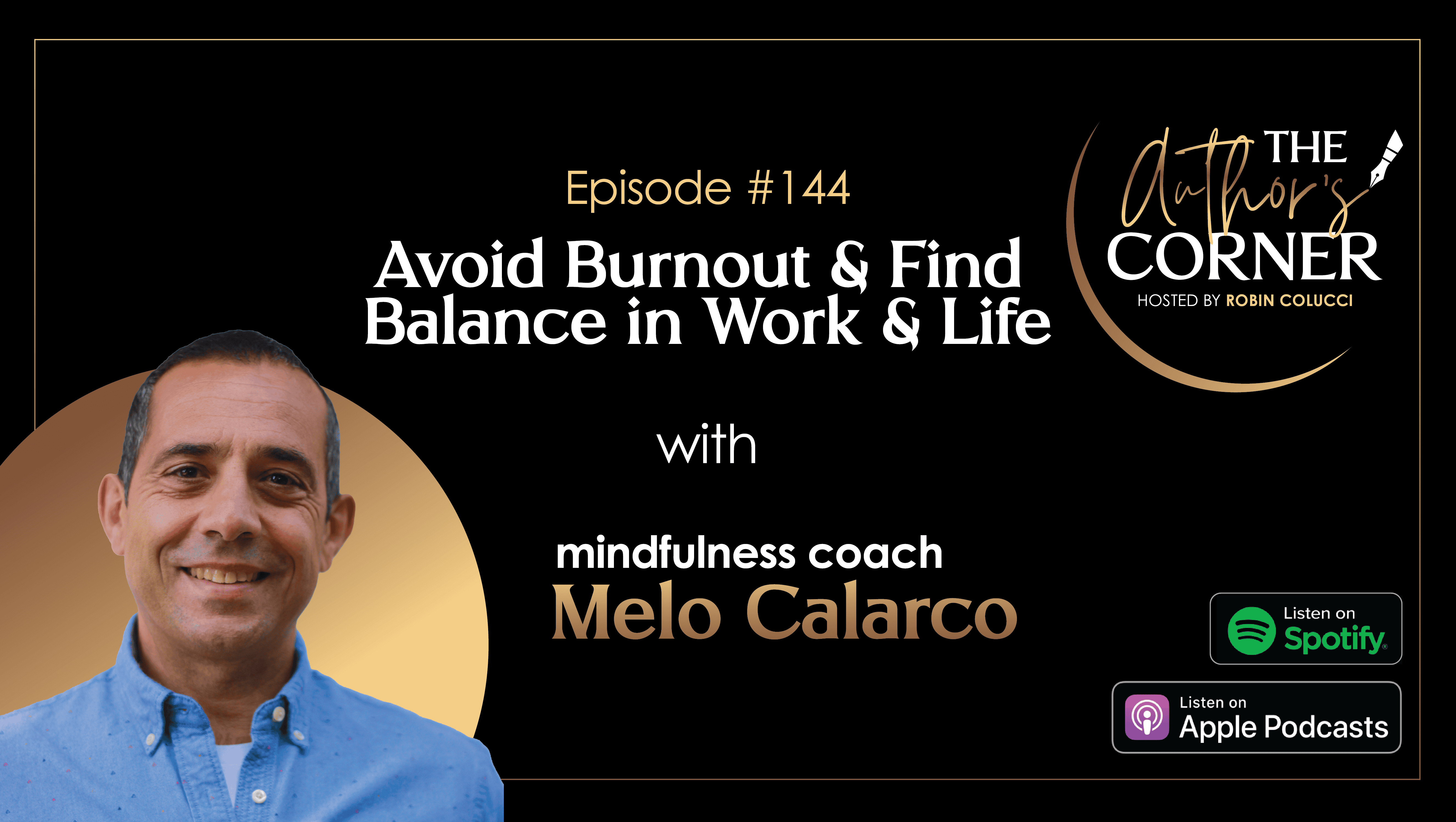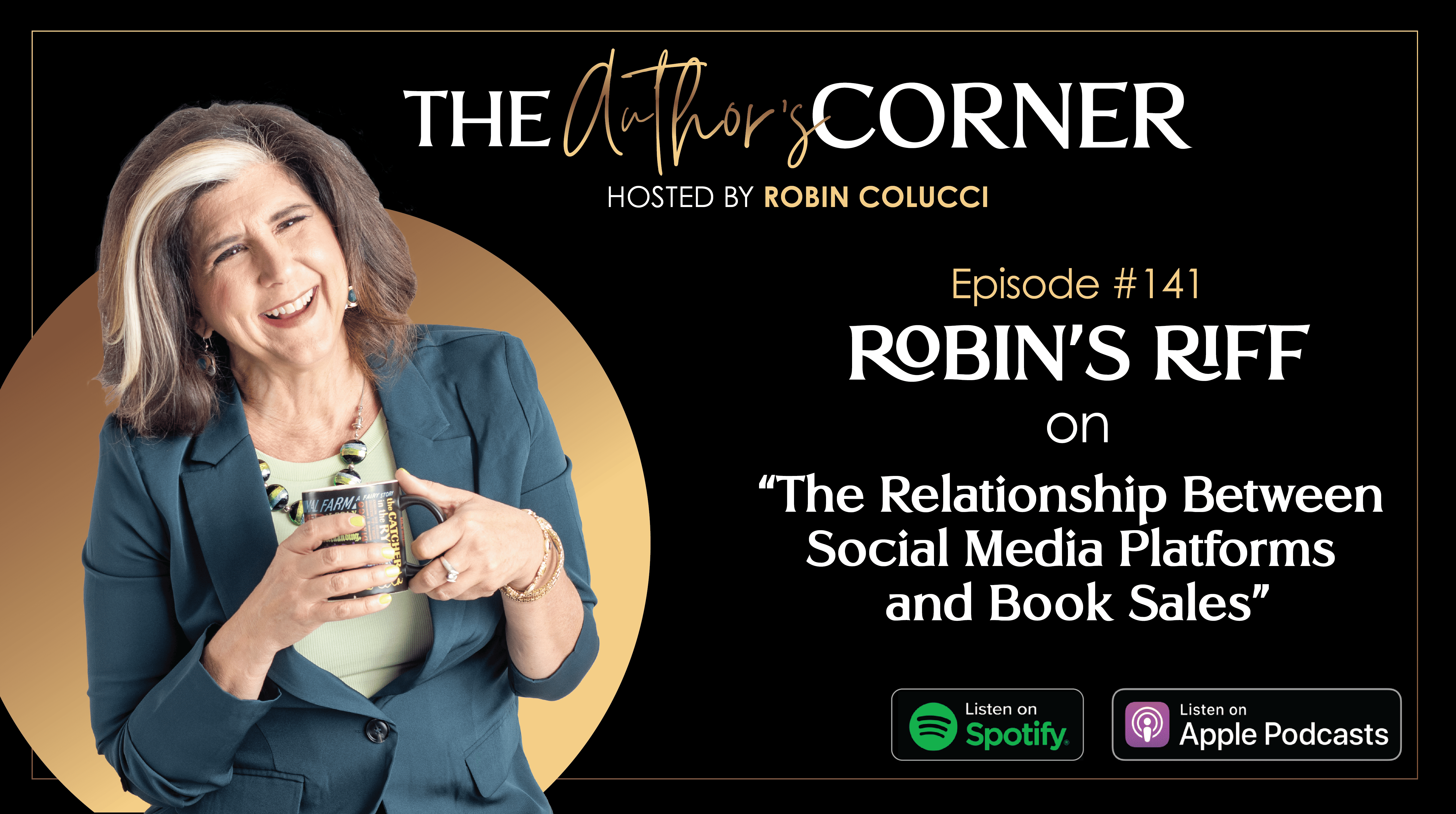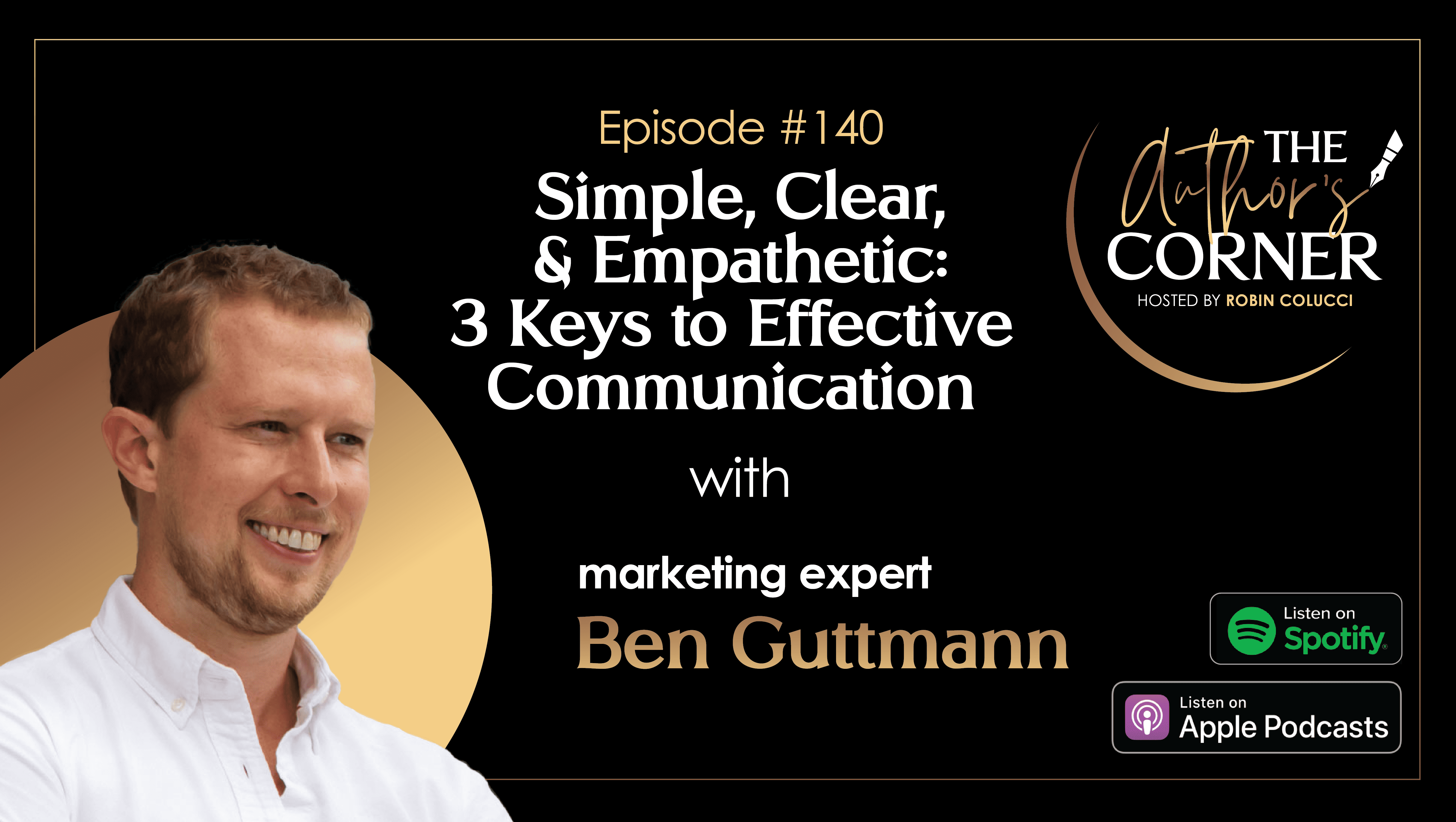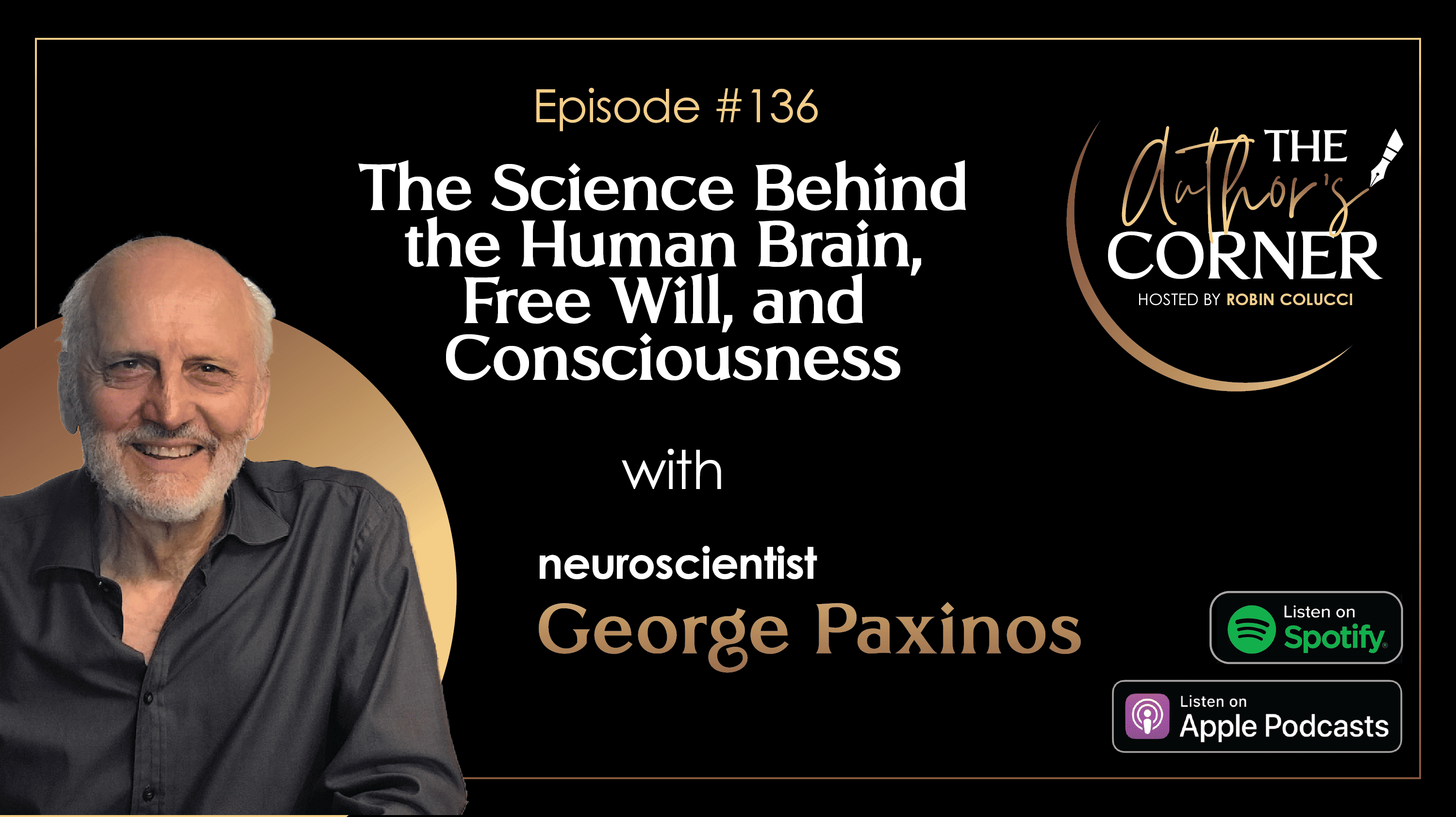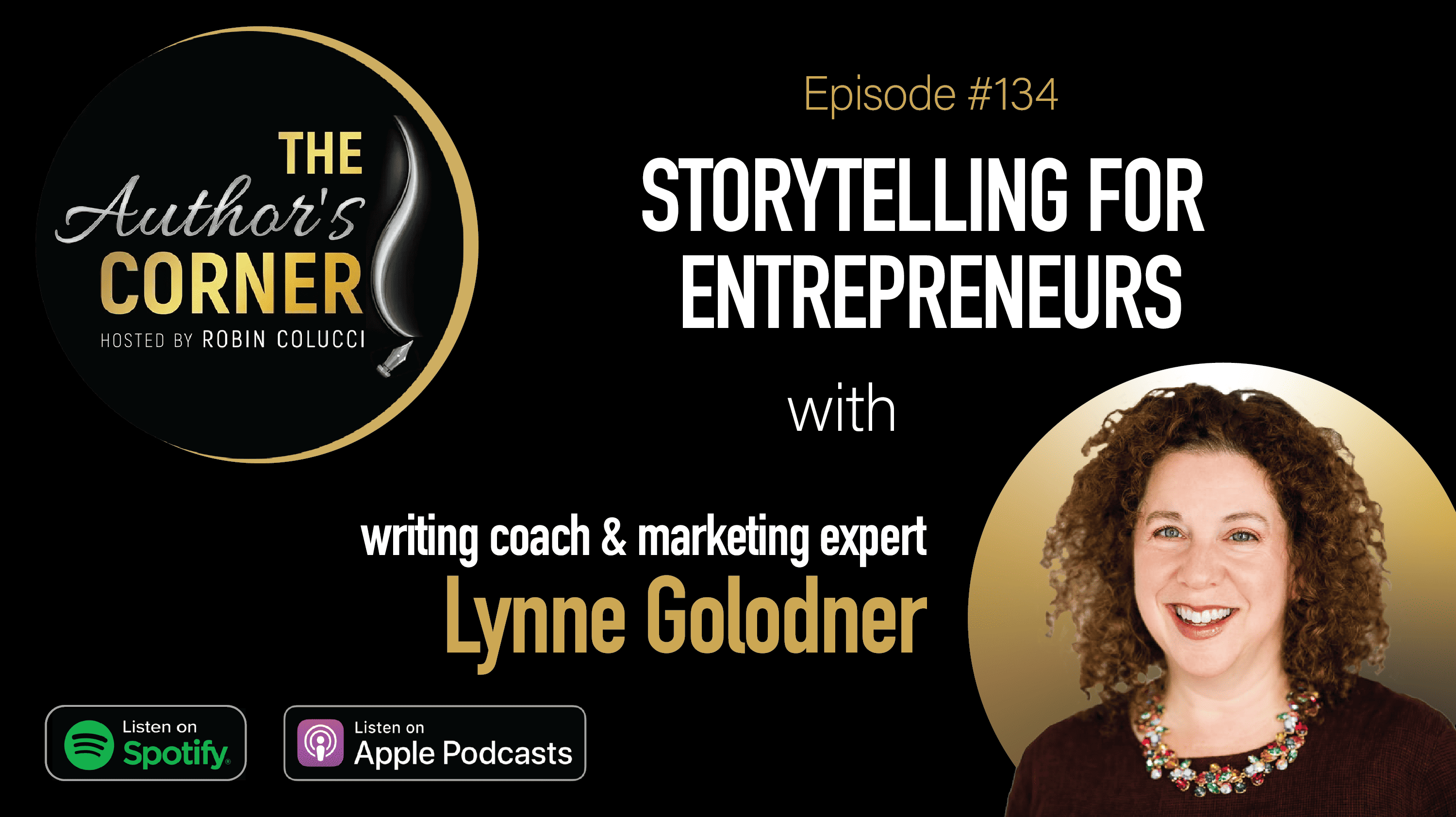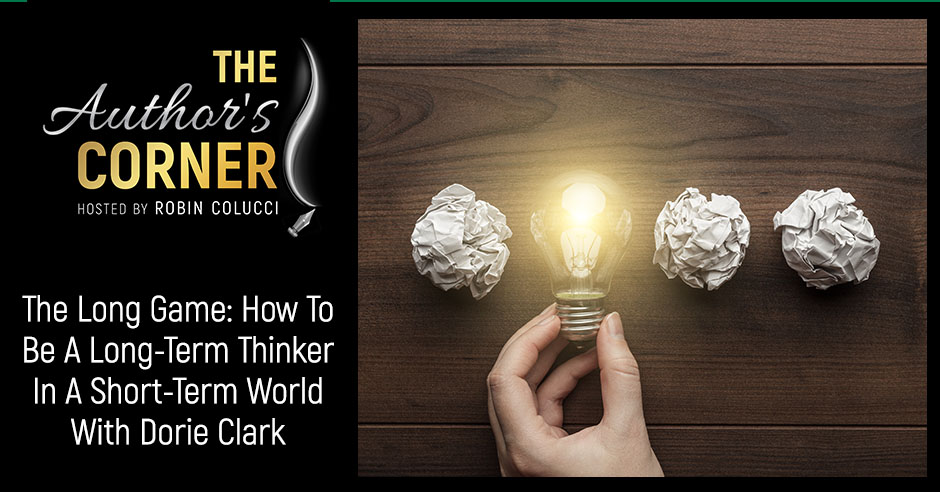
Many authors get held back from pursuing success because it can’t come too soon for them. But achieving long term success comes from thinking strategically and playing the long game. Recognizing how many of her fellow authors are getting trapped in the short-term mindset, world-renowned keynote speaker and author Dorie Clark addresses this in her upcoming book, The Long Game. Joining Robin Colucci in this fun and relatable episode, Dorie explains the difference between short-term thinking versus taking the long view approach. If, like so many of us in the industry, you are feeling like your efforts aren’t taking you to the pinnacle fast enough, you’re going to get your mind changed by this episode.
—
Watch the episode here:
Listen to the podcast here:
The Long Game: How To Be A Long-Term Thinker in A Short-Term World with Dorie Clark
I’m very pleased to introduce you, Dorie Clark. She helps individuals and companies get their best ideas heard in a crowded and noisy world. She has been named one of the Top 50 Business Thinkers in the world by Thinkers50 and was honored as the #1 Communication Coach in the world at Marshall Goldsmith Coaching Awards. She is a keynote speaker and teaches for Duke University’s Fuqua School of Business and Columbia Business School. She is the author of several books, including Entrepreneurial You, which was named one of Forbes’ Top 5 Business Books of the Year, and Stand Out, which was named the #1 Leadership Book of the Year by Inc. Magazine. Her latest book, The Long Game, will be coming out this September 2021.
Dorie is a frequent contributor to the Harvard Business Review. She consults and speaks for clients such as Google, Yale University and the World Bank. She is a graduate of Harvard Divinity School, a producer of multiple Grammy-winning jazz albums and a Broadway investor. You can also download Dorie’s free The Long Game Self-Assessment Workbook and learn more about Dorie and her work at DorieClark.com/TheLongGame. After you’ve read this interview, you’re going to be excited to download that self-assessment.
One of the key themes that we cover here is what makes for long-term success. We look at the differences between thinking short-term and quick wins and quick rewards versus taking that long-view approach. I invited Dorie to be with us because this is an issue that I see show up repeatedly with authors where there is a tendency, especially for first-time authors, to grossly underestimate how much time it takes to produce a quality book, obtain representation and close a book deal.
Once the book is out, way too many authors give up on their marketing efforts too soon. This is a great episode to read. Be sure to make a note of some of the traps that you might be vulnerable to falling into. Make sure that you create some support in your life so that you can avoid those traps and experience long-term success as an author. That’s all I have to say about the episode. Sit back and enjoy.
—
Dorie, welcome to the show.
Robin, I’m glad to be here. Thanks.
I’m so excited to have you. I’ve been anticipating this interview because we’re going to talk about playing the long game in a short-game world. Is that it? Help me out here.
The saddest thing in the world is somebody smart and talented giving up too soon. Share on XYes, how to be a long-term thinker in a short-term world. That’s it.
The Long Game: How to Be a Long-Term Thinker in a Short-Term World is your upcoming book coming out on September 21st, 2021. That’s super exciting. I’m so excited to have you here because I know that a big barrier to authors seeing the success that they want to see with their book once it’s out in terms of generating momentum around sales is that they have a tendency to think very short term. The pattern is to promote the book for the first 1 to 3 months and then if it doesn’t catch on right away, move on to other things. I’m hoping that you’ll be able to provide some insights for our readers about some of the benefits of long-term thinking. Before we get into that, tell us a little bit about your background for our readers. Specifically, what led you to write this specific book?
What made me want to write the book is I’ve run an online community called Recognized Expert™ for years. It is for smart and interesting professionals that are good at what they do. They have good ideas to share, but they might not necessarily be sure how to get the word out, build their platform, and get their ideas heard. It’s about being a recognized expert. More than 600 people have been through the program. I have managed to get a pretty good longitudinal perspective of what it takes and how long it takes for people to be able to develop a known brand.
Certainly, I have an N-of-1 with me and that informed my perspective, but it was the process of running the Recognized Expert™ community and seeing trends and patterns over time that made me want to write this book. For me, the saddest thing in the world is somebody who is smart, talented, has good ideas and is giving up too soon. The trouble is when you’re in the middle of it, it’s hard to tell the difference between something that’s not working and something that’s not working yet. I wanted to write a book to help people be able to make that distinction and think through when and how to persevere so they can get to the other side.
What you said is such an important thing. It’s like something that’s not working and something that’s not working yet. That also brings me back to our audience of authors where there’s this whole aspect of growing a platform so that you can even get the book deal and worry about your book sales. It is true. Why do you think so many people give up too soon? Do you think they have an unrealistic idea at the beginning of how long it takes? What do you think is the reason why people give up too soon?
There are a couple of things, which tie into each other. One certainly is social media doesn’t help because as humans, we tend to compare ourselves to others in general. That’s how we understand what’s normal and that’s how we frame things. There’s a great quip that I quote in The Long Game by H. L. Mencken who was the Mark Twain of his day about 100 years ago. He said that true success is making $100 more a year than your brother-in-law does. Let’s adjust for inflation but it’s still true.
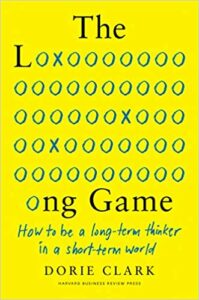
These days, it’s not just our brother-in-law. It’s everybody. We’re not just seeing the people around us. We’re seeing all the people. It can appear that everybody else has it figured out. Everybody else is going faster and going better. That’s a big part of it, but the other piece is oftentimes, there are some dramatic either over or underestimations of what something will take.
One of the stories that I tell in The Long Game is about a story that Jeff Bezos tells in the 2018 Amazon Shareholder Letter. He talks about a friend of his who wanted to get good at yoga and hired a handstand coach. The handstand coach revealed that the average person thinks it takes about two weeks in order to master a handstand. It turns out no. It takes about six months of daily practice to be able to do that. If we apply that out to our life, this is people underestimating or misunderstanding it by a factor of twelve. It is shocking the degree to which we sometimes don’t appreciate what is involved in being able to do something well.
As someone who was a competitive gymnast for ten years in my youth, I don’t know that I ever mastered a handstand. I practiced a good solid twenty hours a week, not just on handstands. It’s a difficult skill, especially if you want to hold it for a long time and come out of it gracefully. Many people are looking for that instant fix like the instant author, the instant authority, and having a thriving business. I don’t think it has ever been true that you could do that. What you’re saying about social media, maybe it’s the challenges that our expectations have changed, not so much that the process is all that different. What do you think about that?
One of the people that I profiled in the book is my friend. He has been a coaching client for many years, Ron Carucci. Ron is somebody that over the years has dramatically expanded his profile. He has done 100-plus articles for Forbes and Harvard Business Review. He has given multiple TEDx Talks. One of them has been seen over 100,000 times. He is doing well. He is somebody that certainly a lot of other people would look at and say, “It all happens so fast for him. It’s so successful.” What I love about my interview with Ron in the book is that he shares what the journey is like on the inside. He says, “We all nod and say, ‘There’s no magic bullet and no overnight success.’ All of us secretly think that there is and want it.”
Meanwhile, these things are unfolding and it’s not one thing that does it. It’s 10 or 100. What enabled Ron to be able to start regularly contributing to these august publications are the hundreds of articles that he wrote in obscurity before that for his own company blog. The issue was that nobody saw them aside from people that already knew Ron and were already looking for it, but he was honing his skills. He was able to go fairly quickly once he trained his sights on they’re doing the right thing which is, “How do I get into places where more people will be exposed to my work?” It was far from overnight in the process to be able to get there.
That’s even reminding me also of another area of being an artist. I had a conversation with my cousin because I commissioned her daughter to do a painting for me. She was asking what I paid her for it and thought that was a lot of money. She goes, “She said it only took her about ten hours to do the painting.” I said, “No, it took her hundreds of hours to develop the skills that enabled her to do the painting.” That’s what we’re talking about.
From the outside, looking in at the so-called overnight success is because, by the time the person becomes visible for you to even notice that they’re on the journey of success, there are already so many months, days and years behind them of preparing to be seen. It can appear that the person just rocketed to success, but it isn’t the case. Do you have any pointers for people who are feeling frustrated with how long things are taking? We all have those days.
When you're in the middle of it, it’s hard to tell the difference between something that’s not working and something that’s not working yet. Share on XOne of the concepts that I talked about in The Long Game is what I call looking for the raindrops because a problem that a lot of us have is that when we think about success like, “What would success look like?” What we’re envisioning is the big win, “Success is hitting The New York Times Bestseller list. Success is getting on Oprah’s podcast. Success is when I’m on Good Morning America.” That is a success, but that is rare and hard to get to. Frankly, even if you do get to it, that takes a long time. There is a huge period in between now and then. If you don’t have the patience of Job, it would be extraordinarily difficult to wait in between if you thought that was the first and only sign of success.
Instead, raindrops are these small and very subtle initial hints that something is moving in the right direction. They’re the kinds of things that are often easy for us to dismiss. We might overlook and not notice them. It’s like, “Yeah, but.” We need to embrace them and focus on them. It’s things like, “You’re not on Good Morning America, but you got invited on a random podcast from somebody that doesn’t know you because they heard about your book.” That’s a success. You start getting all these friend requests on Facebook, Instagram or LinkedIn because people are hearing your name. They’re interested in you and learning more about your work. You get invited to speak at a conference. Maybe it’s not paid at first or maybe they want you to do a workshop but not the main keynote. Do not overlook that. That is a sign of progress.
Paying attention to the forward movement that you have along the way helps you stay in the long game. One of the things you said very early on was many people quit too soon. Do you have any pointers for somebody to know the difference between quitting too soon and quitting because maybe you should try something else?
This is the million-dollar question because nobody wants to be the sucker who in 2020 is being like, “Yes, but this is an amazing fax machine business.” There are a few things to keep in mind. The first is something that is certainly a best practice that a lot of people do not follow, but I would recommend following. At the outset or in the early days of your project is when you’re the most rational. It gets hard to be rational when you’re in the thick of it because we tend to either be way too up like, “It’s just around the corner. It’s going to happen,” or sometimes we plummet into the depths of, “It’s never going to work. Nothing is going right.” You get a little crazed.
In the beginning, before you have definitively committed, this is the time to look at something rationally and say, “If I were to do it, what would the metrics of success be? What would it look like? If we’re 6 or 12 months into the business, how much revenue should we have earned?” Whatever the way of thinking is, you write down your assumptions and why you’re assuming that. You get to that point and evaluate.
If there has been some crazy extenuating circumstance, then maybe it doesn’t invalidate it. If your projections are off and you’re like, “I should definitely be able to do this handstand in two weeks,” and three months in it’s not happening, and this is important, you either had very erroneous assumptions which you need to correct or maybe there’s a problem with your execution. You need to start asking the questions about which it is and trace that back. That’s one piece.

If you’re already in the middle and already irrational, then the thing to do is to talk to your rational friends. This is why I’m a big believer in creating a mentor board of directors of people whose advice you trust. I talked about this in my first book, Reinventing You. Even when you’re a little deranged up or down about your idea, they are the people who can give you honest feedback about how you’re doing and whether you’re making the progress you should.
I’m glad that you qualified friends because when you’re trying to go to a new level, not all your friends are going to be the best judge of whether you’re on track or not. It’s about friends who maybe have already succeeded in the area that you’re wanting to grow. I don’t go to my friends with jobs for entrepreneurial advice, especially in the early days, because they all would have told me to quit and get a job quickly.
You have to judge wisely. There is certainly a place for people who love you like your mom. You want the people who are like, “That’s wonderful. That’s great.” You’re exactly correct. They are not the people who are the judge of whether your venture is proceeding as it should. That needs to be people who both care about you legitimately. They don’t have to be your best friend but they want the best for you, and people who are knowledgeable enough to be able to give you reasonable guidance about that field.
This is where having a great coach can also be key.
In The Long Game, I have a section talking about that because there are certain areas where everybody knows all the sports coaches. That’s a thing. It’s interesting and surprising but we can and I would argue that we should have coaches in all kinds of areas, whether it is a book coach. That is wonderful. One of the things that I talked about in my book is the fact that I started writing musicals a few years ago. I hired a musical theater coach, which was extremely helpful.
I work from home so I don’t have to rent an office or any brick-and-mortar location. My policy is that I always have a coach. The reason is that I have this little piece of real estate right here between my two temples, this little 6 inches of real estate that’s worth a lot of money if it’s taken care of. As I’ve gone through, I pay more for coaching but it’s because I’m moving into better neighborhoods.
You got to do the maintenance, HVAC, repainting and all the things.
Learn to be not just patient but strategically patient. Share on XYou got to change the paint sometimes. To me, it’s rent. It’s an overhead line item that I have to pay. I’ve worked with many different coaches because I’ve needed different people and different kinds of expertise at different points.
What kinds of things have you had coaches for?
I’ve had several different business coaches. I’ve also had a stand-up comedy coach, guitar teacher and vocal coach. I’ve got several coaches. Even in terms of business coaching, I focused on working with people who had the right information for me or the right skillset to guide me through a particular stage that I was in. I found that very natural. With some people, I’ve worked with for three years or more. Others for maybe just 1 or 2 years. It has always been so beneficial because I’ve found that I work with them until I know that it’s time to move on to the next, whatever that’s going to be. I’m friends with all of them still, which is nice. It has been so helpful. I’m so curious about your musical theater stuff. We’ll have to talk about that sometime. In your own long game experience, tell us a story that illustrates what your core message is for your book, and what you want your readers to take away.
This is as good a place as any to talk about musical theater. Ultimately, my contention in the long game is that while it would be nice and be very good if things happened fast, mostly they don’t. We either need to reconcile ourselves to that or we quit and give up. Sometimes that’s the right answer but if we want the thing, then we probably need to learn to deal with it. We need to be not just patient because to me, that implies a level of passivity that I don’t like, but strategically patient. My book is about that.
In the case of musical theater, a few years ago, I decided I wanted to learn to write musical theater. I created a ten-year plan for myself. The ten-year plan was that I would write a show and get it on Broadway for the 2026 season. I started not knowing anything about how to write musical theater. I was not even that big of a fan of musical theater. I didn’t know the canon. I had no idea. Over the course of five years, I have now dramatically upped my cultural literacy around musical theater.
I have been accepted to and graduated from a prestigious musical theater training program run by BMI. I’m part of their Advanced Workshop now. I have written a complete musical, which now I’m networking with directors and producers and working to get a workshop reading of it. I’m pretty much right on schedule. We’ll see what happens in 2026. One of my points is that if you have a long enough runway, you can accomplish almost anything. It’s just about being strategically persistent in moving it forward.

That is so mind-blowingly exciting. How did you even have the courage to take that on?
It was certainly not easy from a self-esteem point of view once I got in. The first time I applied to the BMI program, I was rejected. I was not even just rejected. They have multiple stages of the application process. I was rejected from the first stage. They were like, “No, talk to the hand.” That is why I got a coach. The second time around, I was like, “I’m going to get into this thing.” I hired a coach who was in the program and I was like, “What do I need to know?”
It was so invaluable because I couldn’t guess. I had no idea what they were after, but this person helped me understand, “This is what they want. This is what they’re talking about. This is what they’re optimizing for.” I was like, “Okay,” because there’s so much implicit knowledge and that was very valuable. I’ve pretty much never written musical theater. I’m just learning. I was like, “This is great. It’s a training program. I’ll get trained.” Meanwhile, two of my classmates have Master’s degrees in Musical Theater. I was like, “Are you joking?”
I love what you’re saying because this is so similar to the publication process and pitching. There are several people who come to us after having tried to compose a book proposal or get an agent on their own. It’s not that they have a bad idea. It’s just that they don’t understand the format and all these implicit rules that nobody tells you. In the industry, they know it when they see it and when they don’t see it. If they don’t see it, you’re not going to get a deal.
It’s not necessarily that people are hiding information from you, although sometimes it’s the case. It’s mainly that they have not unpacked it themselves. It’s completely implicit. They wouldn’t even know where to start. What you need is a guide like you who has studied the process and is able to understand it. I think about this all the time because I have a lot of clients in my executive coaching work who want to break into the Harvard Business Review.
HBR has some guidelines on their website. They’ll tell you the obvious things like, “It should be this many words and it should have this.” There’s a lot more that is not said. I have spent years trying to break down and understand this process. I’ve developed enough pattern recognition at this point that I can tell you almost instantly why a piece will or will not work and why. The editors would know will it work or not, but they would probably have a harder time explaining the rationale. It’s an interesting process that comes from reverse-engineering something in-depth.
When you’re able to do that, it’s because you’ve succeeded. When I was hearing you say about how you hired a coach and then your very next application you got accepted, my first thought was, “If you hadn’t have hired that coach, it would have been ten years probably for you to even get accepted to the program because you would have had to have so many rejections, and then so much unpacking and trying to figure out how to even get into the program.” It’s like the long game with coaching is a shorter game.
If you have a long enough runway, you can accomplish almost anything. Share on XIt’s the blockbuster sequel, The Somewhat Less Long Game.
What have I not asked you that our readers need to know here that I should have asked?
Thinking through something that would be close to the heart of many of your readers is one of the people that I profiled in The Long Game. She’s a friend and also a longtime client of mine, a woman named Anne Sugar. She is an executive coach and writes for Harvard Business Review. One of the stories that I tell in the book is about her adventures in writing for another publication. This is all free. It’s like the usual thing. You’re giving your blood, sweat and tears for free. There’s a publication she started writing for. It’s a pretty high-profile one. She wrote for them for six months and did 35 pieces. At the end of six months, her editor who was two years out of undergrad fires her from her free position and says, “Sorry. We don’t think your work is creative enough for us.” If you think about how any of us would receive that like, “I’ve been doing this for six months on my nights and weekends for free.”
Thirty-five articles in six months are no small task. I’m so proud of myself if I can do one a week.
It’s serious. She was upset as you might imagine. I commend her approach because what she did was she said, “I need some perspective. I need to talk to some people.” She reached out to friends and colleagues. She said, “Has something like this happen to any of you? What did you do?” She reached out to a number of people and many of them encouraged her. She reached out to one woman and the woman said, “Yes, the exact same thing happened to me. I was writing for this place and then they said it was no good.” Anne said, “What did you do?” The woman said, “I never wrote again.” Anne said, “Damn.” She realized at that moment, “That’s not what’s going to happen to me,” because Anne love writing.
She realized that if she let this derail her permanently the way that it had for this other woman, it was all going to be in vain. She vowed that she would get back on the horse. Within three months, she had landed on another publication, which she continues to write for, where they appreciated what she was doing. It was as prestigious, if not more prestigious, publication. Just because some little asshole tells you that your work is not good does not mean your work is not good and you should quit forever. It’s powerful and important to realize that even if you get a roadblock, get rejected or get dissed in that way, that continuing to move forward is essential to the mission.
That is the key. It’s not giving up. As I was listening to the story, I was like, “It was good enough for them 35 times.” That is crazy. It’s seeking coaching if you’re stuck or if you realize that it’s going to take way too long to even play the long game if you don’t get help. What’s another core piece of advice that maybe we could end with?

One of the things that stays with me in writing the book, I have a section where I talked about some of the failures that I’ve experienced. In 2019, I set myself a series of five goals. They were all stretch goals and I knew they were stretch goals. They were also not unrealistic stretch goals. They were all things that were plausible if the stars aligned. Throughout the course of 2019, that was when things were normal. One by one, they kept blowing up.
I had a major media organization approach me about possibly becoming a columnist and they were interested. They had me submit four sample pieces over a period of eighteen months. It started the year prior and they kept coming back to me like, “Can you do this sample?” Finally, they rejected me. There was a major talk at a conference that I wanted to speak at that I made my little submission tape. Normally, I get paid to talk. For this one, I made my little submission tape and they never got back to me. I did not speak there and the conference went on.
I wanted to option the rights to my favorite movie to turn it into a musical. The director said yes and he agreed. He even said he wanted to partner with me on it. We started working on it. A few months in, he said, “Sorry. I want to turn it into a play by myself.” The last one, the book-related one, I was working on a book. I wrote a proposal and sample chapter ready to go with a very successful and famous author. We were going to co-write it together. This is going to be a big deal. This person got a $1 million book deal for a book that was not our book. He ended up saying, “Sorry.” Not that I blame him but nonetheless. All of these things, it’s like, “When is this going to turn around?”
Finally, at the end of the year, it was late November 2020, the last thing that I had hoped for did come to fruition. There was a big award and I won it. That was exciting and meaningful. Slogging through all of that, we all experience it. At whatever point in our careers, even when we’re fairly well-established, we go through runs where it’s like, “Things are not working.” It’s important for all of us to recognize that those stretches come. It’s important to keep moving forward and to keep playing the long game. For people that are interested in how to hone that a little bit more, I do have a free resource which is The Long Game Strategic Thinking Self-Assessment. People can get it for free at DorieClark.com/TheLongGame.
I’m going to be sure to check that out. Dorie, thank you so much for being here with us on the show and sharing all your amazing wisdom. We look forward to your book, The Long Game: How to Be a Long-Term Thinker in a Short-Term World, coming out this September 2021. Everybody, keep your eyes out.
Thanks, Robin.
Important Links:
- Dorie Clark
- Entrepreneurial You
- Stand Out
- The Long Game
- DorieClark.com/TheLongGame
- Recognized Expert™
- Reinventing You
About Dorie Clark

Dorie Clark helps individuals and companies get their best ideas heard in a crowded, noisy world. She has been named one of the Top 50 business thinkers in the world by Thinkers50, and was honored as the #1 Communication Coach in the world at the Marshall Goldsmith Coaching Awards. She is a keynote speaker and teaches for Duke University’s Fuqua School of Business and Columbia Business School. She is the author of The Long Game, Entrepreneurial You, which was named one of Forbes’ Top 5 Business Books of the Year, as well as Reinventing You and Stand Out, which was named the #1 Leadership Book of the Year by Inc. magazine.
A former presidential campaign spokeswoman, Clark has been described by the New York Times as an “expert at self-reinvention and helping others make changes in their lives.” She is a frequent contributor to the Harvard Business Review, and consults and speaks for clients such as Google, Yale University, and the World Bank. She is a graduate of Harvard Divinity School, a producer of multiple Grammy-winning jazz albums, and a Broadway investor. You can download her free Long Game self-assessment workbook and learn more at dorieclark.com/thelonggame.
Love the show? Subscribe, rate, review, and share!
Join The Author’s Corner Community today:



